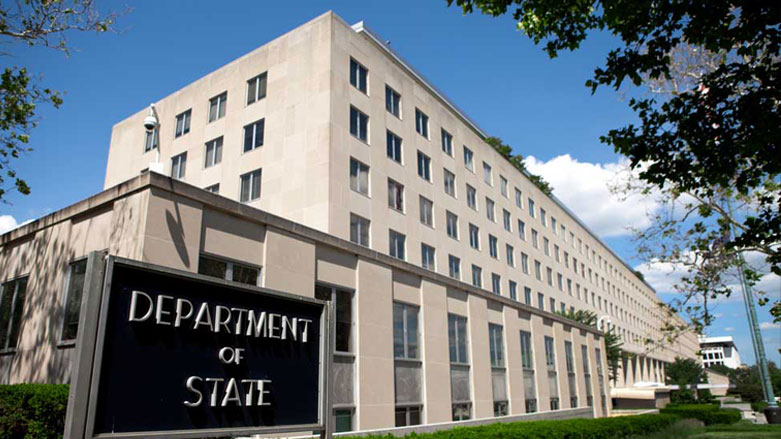US: no ‘constructive proposal’ from Iran after week of nuclear talks
“Iran’s approach this week was not, unfortunately, to try to resolve the remaining issues.”

WASHINGTON DC (Kurdistan 24) – The US expressed its disappointment on Friday with Tehran’s position, following the conclusion of the most recent round of talks on restoring the 2015 Iranian nuclear deal.
No Progress
“The new Iranian administration did not come to Vienna,” where the nuclear talks are being held, “with constructive proposals,” a State Department Spokesperson told Kurdistan 24.
“The first six rounds of negotiations,” conducted between April and June under the previous Iranian government of Hassan al-Rouhani, “made progress,” he said.
He noted that those discussions had produced “creative compromise solutions to many of the hardest issues that were difficult for all sides.” However, “Iran’s approach this week was not, unfortunately, to try to resolve the remaining issues.”
Thus, the 7th round of talks on the nuclear deal, formally known as the Joint Comprehensive Plan of Action (JCPOA), ended on Friday with no progress and “Special Envoy [Robert] Malley,” who led the US delegation, “and his interagency team are returning to Washington now,” the Spokesperson said.
The result was not unexpected. Just before the talks began, Iran’s chief nuclear negotiator and Deputy Foreign Minister, Ali Bagheri Kani, asserted that Iran sought “a full, guaranteed, and verifiable removal of the sanctions that have been imposed on the Iranian people.”
Read More: Low expectations for success, as Iran nuclear talks resume
Among other points, unless the agreement is a treaty—approved by a two-thirds majority of the US Senate—no US administration can bind its successor.
The result of the week of negotiations belies the wildly optimistic view expressed by the representative of the European Union (EU), Enrique Mora, who chaired those discussions.
After a first meeting on Monday, Mora hailed the renewal of the talks as “extremely positive,” with all parties displaying “a sense of urgency” in the effort to re-establish the agreement.
Read More: Iran nuclear talks resume amid mixed signals
However, that did not prove correct. If anything, it was the opposite.
Iran’s Increasing Violations of its JCPOA Commitments
The State Department also stressed the significance of Iran’s increasing violations of its commitments under the terms of the JCPOA—despite an earlier Iranian promise to cooperate with nuclear inspectors from the International Atomic Energy Agency (IAEA.)
On Wednesday, the IAEA reported that Iran had begun to boost its production of enriched uranium, using more efficient and advanced centrifuges, at Fordow, an underground uranium enrichment facility, buried in a mountain near Qom.
Describing that development as “even more” important than the stalemated talks in Vienna, the Spokesperson said, “Iran started this new round of negotiations with a new round of nuclear provocations,” as just reported by the IAEA.
“And they have still failed to reach an understanding” with the Agency on restoring its earlier access to the monitoring of Iran’s nuclear facilities that is necessary to ensure that what Iran is doing in the nuclear field is properly understood, he added.
The Trump administration’s “withdrawal from the JCPOA has led to a dramatic and unprecedented expansion of Iran’s nuclear program,” he warned. “That cannot continue. It will inevitably lead to a crisis.”
That is not far from the position of senior figures in Israeli military intelligence.
Last Friday, Amos Yadlin, head of military intelligence from 2006 to 2010, criticized former Prime Minister Benjamin Netanyahu for encouraging Donald Trump to leave the JCPOA.
It was predictable, Yadlin said, that Iran would respond by abrogating its own commitments under the agreement. But “when the Iranians moved down this path,” he stated, “neither Trump nor Israel prepared a plan for how to stop them.”
Current Diplomatic Course or “Other Options”?
Still, the Biden administration would like to continue its current course. The negotiations in Vienna are slated to resume in the middle of next week.
“There is a better alternative” than a breakdown in the talks and a resort to some other way of dealing with the Iranian nuclear threat, the Spokesperson told Kurdistan 24.
“President Biden has said that he is committed to returning the US to compliance with the JCPOA and staying in compliance so long as Iran does the same,” the Spokesperson continued. “He means it.”
“If Iran is equally committed, a solution is at hand,” the Spokesperson concluded. “If they are not, then we will have no choice but to pursue other options.”